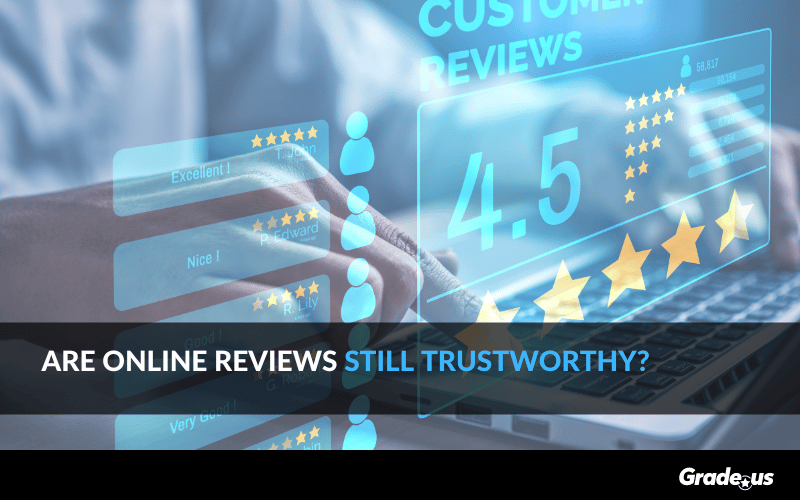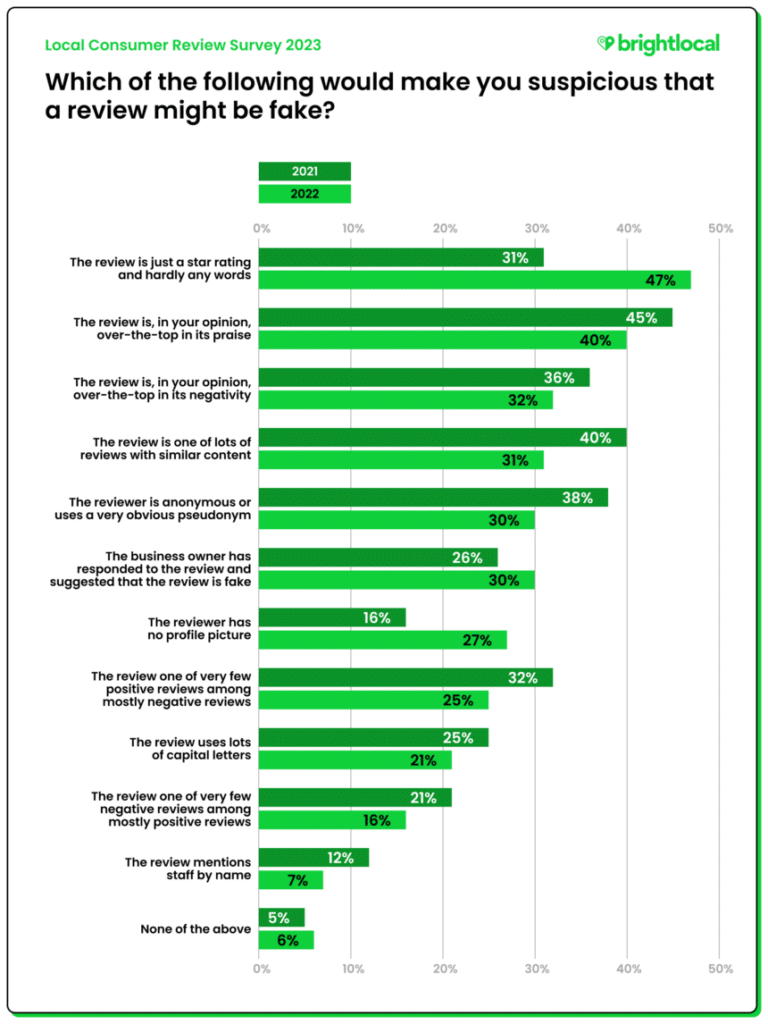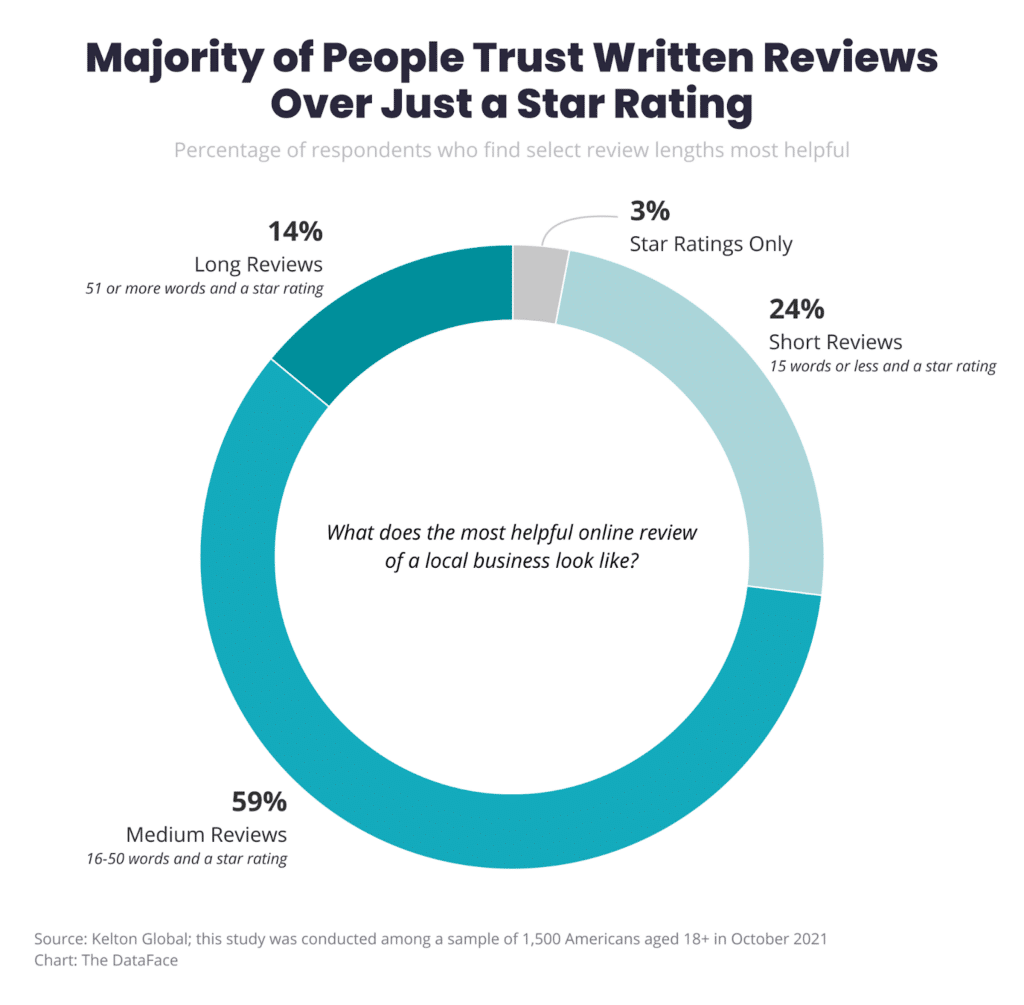Agencies: Let us show you how Grade.us can help you 2x, 4x, and even 10x your Business with our suite of Review Management tools. Schedule a no-obligation demo to learn more.
Do you remember this story?
This is outrageous!
This customer ordered food, ate all of it, demanded that the restaurant comp the meal, and used the threat of a negative review as the stick to force this local business to comply.
It obviously backfired.
But what if it didn’t? What if this customer decided to post a negative review about this business? Would it be a trustworthy review?
Why trustworthy reviews are important
Can you really trust online reviews? Do online reviews even matter these days?
Most people see the inherent value of online reviews.
A recent survey from Yelp found that “75% of respondents who read reviews in the U.S. say they’re reading more online reviews now than they ever have in the past.”
- 7 in 10 say it’s rare for them to go to a new business without first checking out the reviews
- 3 in 4 say that they are reading more online reviews now than they ever have in the past
- 97% of respondents believe that written reviews, alongside a star rating, are the most helpful type of online review of a local business
- Approximately 59% believe the most helpful review would be between 16-50 words in addition to a star rating
Did you catch it?
The why behind why reviews are important?
It’s the story.
We’re all addicted to stories. They give us context, providing us with a beginning, middle, and end to the customer experience. It allows us to pack lots of detail into a short (or long) story, giving us the anchor points we need to learn quickly.
It’s science.
A recent study made a profound observation about the power of stories.
“Communication is a shared activity resulting in a transfer of information across brains. The findings shown here indicate that during successful communication, speakers’ and listeners’ brains exhibit joint, temporally coupled, response patterns. Such neural coupling substantially diminishes in the absence of communication, such as when listening to an unintelligible foreign language. Moreover, more extensive speaker–listener neural couplings result in more successful communication. We further show that on average the listener’s brain activity mirrors the speaker’s brain activity with temporal delays.”
What does this have to do with online reviews?
A well-written review (positive or negative) the reader to the review. It’s superior communication that works its way past our mental filters.
What about untrustworthy reviews?
Research shows again that “some aspects of socialized knowledge about trust and distrust are ingrained in the language we speak.” That means these aspects are visible in our reviews.
Trust lubricates communication.
Your review portfolio answers the question on your customer’s mind — can you be trusted?
Which reviews are untrustworthy?
Again, this isn’t the right question.
Consumers don’t automatically trust the online reviews listed on, say — TripAdvisor or Google. They trust the corporation and the brand.
It’s kind of like this.
- I trust TripAdvisor, so
- I trust TripAdvisor to police their reviews which means
- I trust TripAdvisor reviews
If the review site has an established brand, customers are more likely to extend trust to that brand and leave reviews on that site. These trustworthy brands build trust with consumers, which they extend to businesses. Okay, let’s change the question. Are review sites trustworthy? The obvious answer is yes, the vast majority of mainstream and niche review sites are trustworthy; their entire business depends on their reputation. One slip-up, and it’s all over.
Okay then, which review sites are trustworthy?
These are the most popular (and trustworthy) review sites, sorted by category.
This isn’t the issue, though.
Here’s the real question: Can customers spot fake reviews when they come across them? As you’ll soon see, this question is difficult to answer.
Can customers spot fake reviews?
What do you mean by fake?
Here’s how researchers defined fake reviews:
“Fake reviews are defined here as “deceptive reviews provided with an intention to mislead consumers in their purchase decision making, often by reviewers with little or no actual experience with the products or services being reviewed.”
The definition does not focus specifically on the content of the review, which is often times misleading or inaccurate. It focuses instead on the deceptive intention of the reviewer, who, through an untruthful opinion, aims to promote or damage the targeted product’s reputation.” You know, dishonest reviews from malicious customers like these.
Source: GlobalNews.ca
This really complicates things. Research by Natalie Glance at Google shows fake reviews have their own ecosystem. There are fake reviews that come from…
- Your competitors posting fake reviews about your business
- The company being reviewed
- People who have never visited the business
- Angry or disgruntled customers
- Private review groups (i.e., business owners exchanging positive reviews)
- A political or social faux pas
- Criminal Organizations that extort or blackmail companies for cash
- People with the goal of harming your company
- Third-party companies that are hired to write fake reviews
Can customers tell the difference?
The bad news?
Not usually. Even worse, researcher Davide Proserpio et al. found that, in the very short term, fake reviews are very effective.
“In the two weeks after sellers began to recruit reviewers, their products’ ratings increased by an average 0.16 stars, and the average number of reviews these products received per week doubled from five up to an average of 10 reviews per week. This increase in reviews translated into a significant boost in sales, with these products experiencing an average 12.5% bump in their sales ranks.”
So you should buy fake reviews then?
Not so fast.
This study revealed some very good news.
“We saw that the increases in ratings, number of reviews, and sales tended to fade out within one to two months. Just eight weeks after the sellers stopped buying fake reviews, their products’ average ratings fell by 6.3%, their sales ranks fell by 21.5%, and they started to receive large numbers of one-star ratings from unhappy customers. This suggests that these products were actually of lower quality, and customers likely felt deceived by the inflated ratings and reviews.”
Are your competitors dishonest enough to buy fake reviews? Not to worry, their success with these reviews is short-lived. Lie to customers on the front end, and they’ll eventually figure it out on the back end.
Some more good news?
Customers are getting better at spotting these fake reviews. Research from BrightLocal’s Local Consumer Review Survey shows customers are taking the time to vet reviews more carefully.
What does this mean for honest companies like yours? Fake reviews take way more time, and they produce diminishing returns. Building a trustworthy review portfolio is easier, stable, and longer-lasting.
It just takes some work.
For Agencies Only: Learn how to craft an irresistible sales pitch, win more clients, and drive agency growth with our Review Management Revenue Generator guide.
How to build a trustworthy review portfolio
Start by giving buyers what they want.
Customers are looking for helpful reviews that give them an honest, detailed, insider look at a business, product, or service. Here are the specifics that outline what that looks like.
With that in mind, here are some simple steps you can take to build a trustworthy review portfolio quickly.
- Ask every customer for a review: A 2023 survey found that 65% of your customers are willing to leave a review if asked. Reputation management tools like Grade.us make that simple, easy, and automatic. Use a mix of face-to-face, text, and email requests to get the variety you need.
- Give customers a track to follow: Don’t tell customers what to say; ask specific questions. It’s difficult for customers to respond when they don’t know what to say. Many won’t admit that fact, they’ll simply ghost you.
- Direct them to review sites: Start with mainstream platforms (e.g., Google, Yelp, TripAdvisor, Facebook, etc.), then focus on industry-specific and niche review sites.
- Spread customer reviews out: Spread your customers out across your mainstream, industry-specific, and niche platforms. Ask the first batch of customers to share their reviews on Google, the next batch on Yelp, then TripAdvisor, etc. Doing this enables you to build reviews rapidly without creating suspicion with review platforms.
- Promote your reviews at key decision points: Promote, embed, or share your reviews at key decision points in your business. Add them on sales, landing, or product pages; add them to your checkout process. Share them on your social media accounts and in your emails.
Pretty simple right?
Not sure where to start?
Take a look at these templates. Customize these for your outreach efforts.
- Email Review Request Templates
- SMS Review Request Templates
- Positive Review Response Templates
- Negative Review Response Templates
It’s a straightforward process; using these templates, you can generate reviews, attract prospects, and win new customers.
Trustworthy online reviews are still important
Ninety-eight percent of consumers occasionally read online reviews before making a purchase online, but 76% always read reviews first. It’s the why behind online reviews that matter.
So, can you really trust online reviews?
Absolutely.
Online reviews matter; story + ratings matter most.
The star rating gives consumers the visual indicators we need to scan quickly. Detailed customer stories give us context, providing us with a beginning, middle, and end of a customer’s experience. It allows reviewers to pack lots of detail into a short (or long) story, giving customers the anchor points they need to learn quickly and make decisions.
But it all depends on trust.
Fake reviews destroy that trust; as we’ve seen, the benefits are temporary. The truth eventually catches up, destroying the reputations of those who use them.
You’re trustworthy without them.
Follow the steps I’ve mentioned above, and you’ll find you’re able to attract a never-ending stream of customers using the whole truth and nothing but the truth.
Agencies: Let us show you how Grade.us can help you 2x, 4x, and even 10x your Business with our suite of Review Management tools. Schedule a no-obligation demo to learn more.












